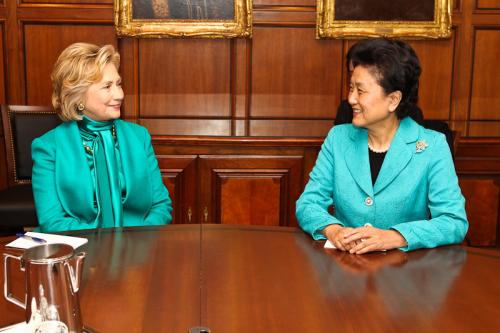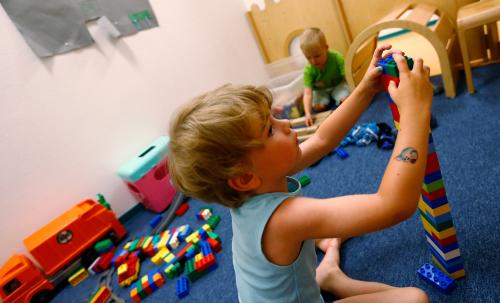The importance of early development for later school achievement, earnings, health and well-being has been clearly established, and there is international consensus that it should be seen as a priority for all countries and a goal for the post-2015 development agenda. Including early childhood development (ECD) in the post-2015 development agenda requires indicators to measure progress, and fortunately there has been growing momentum in recent years to improve the amount and quality of data.
Taking Stock of Early Childhood Development Data
The need for data on early childhood has been affirmed by many groups, including groups convened by the World Health Organization and by the Learning Metrics Task Force (LMTF), which brought together representatives of different organizations and sectors in 118 countries to agree on core elements of learning and measurement from early childhood through secondary schooling. Among the recommendations of LMTF, assessment of early childhood development and learning featured prominently, reflecting the momentum for a focus on early learning in the post-2015 agenda and the recognition of the need for better data globally. The task force proposed readiness to learn upon primary school entry as a key measurement point to track in every country. This recommendation built upon many existing efforts within countries, regional efforts such as the Inter-American Development Bank’s PRIDI in Latin America, the East Asia Pacific Child Development Scales, the ECD prototype developed by UNICEF West Africa, and international efforts such as UNICEF MICS and the Early Development instrument (EDI). There are also a number of efforts to develop early learning measures for program evaluation, such as Save the Children’s IDELA tool. With a growing number of tools available, the feasibility of measuring ECD globally has increased drastically in recent years.
Regular, reliable and comprehensive data on young children’s development and the quality of their learning environments are essential to address the problem of poor learning outcomes in primary school and beyond. They can be used to monitor progress towards national and global goals by identifying children’s competencies and areas of need. Such data can also help ensure that schools and community organizations offer appropriate settings to support children’s holistic development. With early childhood development and learning as a likely target for the post-2015 education agenda, the need for this data is gaining greater urgency.
How Can Data Be Used To Make A Difference For Young Children?
First and foremost, data on young children’s development should be viewed as a tool for inclusion, by encouraging attention to the problems and issues faced by all children, especially the most vulnerable among them. This means that the data must be representative and culturally-appropriate for all children, and technically strong enough to use for decision-making. Second, to use data well, government systems are needed to help make improvements—for example, when measuring quality of pre-primary settings, the data will lead to the greatest positive impact if there are also resources available for improvement of the toys, classrooms and buildings, and through professional development for teachers. The third report of the LMTF describes the barriers and supports needed to effectively use measurement to improve learning as identified by the task force and through consultations with government and civil society stakeholders.
A Collaborative Effort to Fill the Global Data Gap
UNESCO, UNICEF, the World Bank, and the Center for Universal Education at the Brookings Institution have launched a project with experts around the world to examine how to fill the global data gap on early development and learning. The overall goal of the project is to develop a set of population-based measures of: 1) child development and learning, and 2) quality of early learning environments, and then to assist governments in taking these measures to scale and effectively use the data. This project is embedded within a larger dialogue on improving data for early childhood, including a recent international consultation on measuring and improving early childhood environments hosted by the International Step by Step Association.
This effort will produce open-source, freely-accessible prototypes for adaptation within countries; a technical guide for use by countries; a “common core” that can be used in existing or new surveys and instruments to produce regionally and globally-comparable data; and a guide to incorporating these instruments into national monitoring and evaluation systems and effectively use the data. The goal of the project is to develop a set of tools and processes guided by the following four principles:
- Building on existing tools and systems. With a growing number of tools available, the feasibility of measuring ECD globally has increased drastically in recent years. Yet, the availability of these tools has not led to systematic data collection by countries. As a result, there remain persistent gaps in knowledge about the state of young children’s development globally and the quality of their learning experiences in ECD programs prior to primary school. This project will work with existing efforts to support scaling up or adapting existing tools where available. This will include developing a core set of items or constructs that can be used across countries wishing to compare their results regionally or internationally.
- Bringing together key stakeholders at the national level. Systems to support young children’s development and learning are often fragmented, with an array of government agencies, private providers, non-governmental organizations, and donor agencies using different tools and monitoring frameworks. In each of the pilot countries, this project will work to map out the key stakeholders and engage in a dialogue with teachers, caregivers, and parents on the important elements of early development and learning that prepare children for school and life. This national stakeholder group will provide critical inputs into the design and adaptation of prototype tools for cultural applicability and build consensus on how the tools can be integrated into existing monitoring and evaluation frameworks.
- Building system capacity. This project will examine the existing capacity for sustaining a system of measuring early learning and program quality and identify steps to improve capacity. This includes the technical expertise in the country and region; which institution could house and maintain the system; and the political will to implement the system and use the data for making improvements.
- Making tools and information transparent. The project will produce open-source, freely-accessible prototypes for adaptation within countries; a technical guide for use by countries; and a common set of constructs or items that can be used in existing surveys or new and instruments to produce regionally and globally-comparable data. Additionally, the project will work with governments to make the data collected with these tools open and accessible to various audiences. Through an external evaluation effort, the successes and challenges of the project overall will be documented to improve implementation in subsequent phases.
While having better data is only one component of a successful ECD system, it is a critical piece to ensuring all children, no matter their circumstance, have an opportunity to reap the benefits that high-quality early childhood experiences can provide.
The Brookings Institution is committed to quality, independence, and impact.
We are supported by a diverse array of funders. In line with our values and policies, each Brookings publication represents the sole views of its author(s).










Commentary
Global Momentum for Measuring Early Learning Outcomes and Program Quality
November 17, 2014